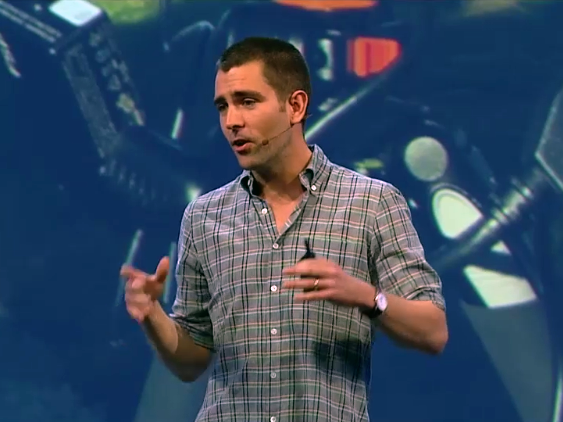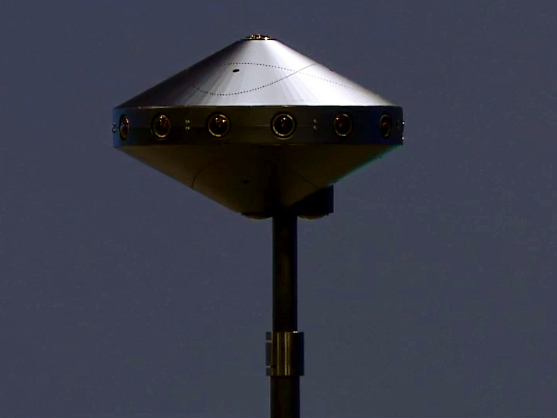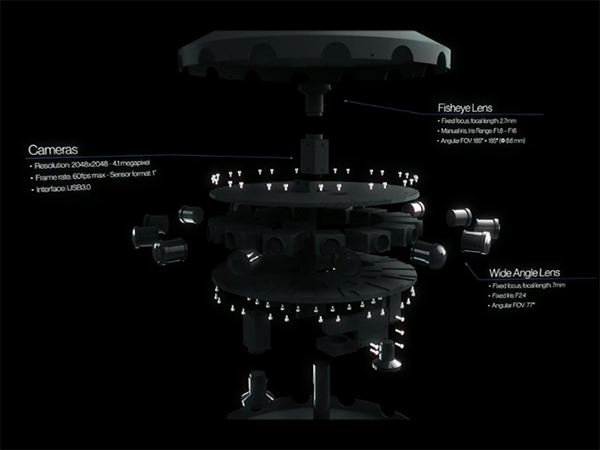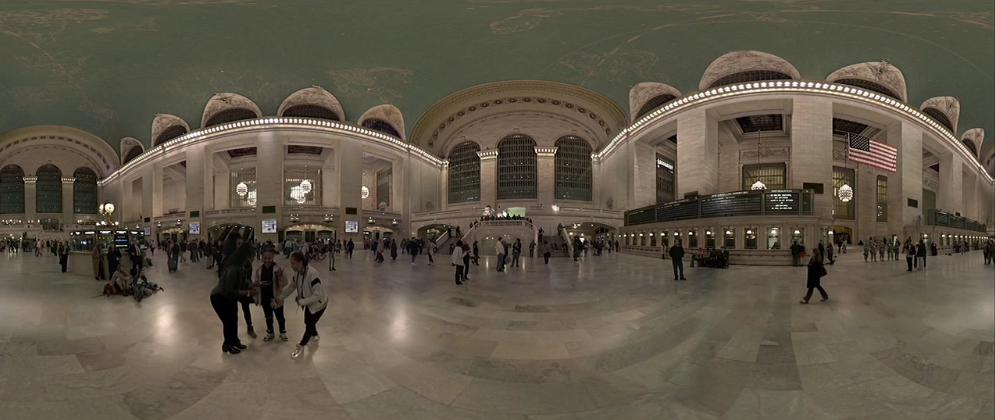Facebook Surround 360 Camera Offers More Than Just 60fps, 8K Per Eye Resolution
Really, it’s just arithmetic. Facebook (as well as YouTube) enabled 360-degree video sharing, and so it follows that the company would find ways to push adoption of the medium. At its F8 conference, Facebook announced the Surround 360 camera, a professional-grade device built to show what one can do with 360-degree video capture.
On stage at F8, Facebook Chief Product Officer Chris Cox explained that creating 360-degree video is, well, difficult. Even once you capture the images, which requires special multi-lens equipment, you have to stitch them together while preserving the fidelity of the images, which is not always so simple. That’s not even taking into account the PC hardware you need to handle all the processes.
The Surround 360 will not solve these challenges, because Facebook didn’t create the device to sell it; instead, it’s a reference design other developers can use to build their own products. Facebook is open sourcing the software and hardware, and the code will be available on Github later this summer.
Cox noted that creating such a camera was a challenge, and the team working on it went through a number of prototypes and much trial and error. For example, he noted, when they used a plastic chassis, they found that the hot sun (not to mention the heat produced by the cameras themselves) warped the case and therefore distorted the images somewhat.
The final iteration, though, is one the team is proud of. It can shoot for two hours and produce fully synced, 3D (360-degree) video at 60fps with an astonishing resolution of 8K per eye. Cox said that very little post production will be required.
In addition to the camera itself, Facebook created the Live API to make it easier to stream live, 360-degree content. (Streamers, start your engines.)
Although Cox didn’t mention the Oculus Rift, the subtext of this 360-degree video effort has to be tied to the Facebook-owned HMD. It is my opinion that user-created content will be key in the adoption of VR. Yes, gaming and professional experiences inside an HMD will be (and are) incredibly compelling, but the potential for sharing your own experiences with friends, loved ones, and in some cases strangers is arguably more important.
Get Tom's Hardware's best news and in-depth reviews, straight to your inbox.
For example, we buy expensive cameras so we can capture high-quality images and video of our kids’ childhoods. How much more important will it be to parents to capture their little ones’ moments in 3D? Or consider the current throngs of extreme sports GoPro videos; give me an immersive 360-degree video of an Olympic-quality skier flying off a ski jump, and I’ll give you all of my money for the privilege of watching it.
Of course, average consumers will not be dropping the many thousands of dollars it takes to acquire all of the parts for Facebook Surround 360 camera. But perhaps TV news networks, sports teams and various developers will, and if and when they do, we’ll enter a new era in the already-nascent field of VR.
Seth Colaner is the News Director for Tom's Hardware. Follow him on Twitter @SethColaner. Follow us on Facebook, Google+, RSS, Twitter and YouTube.
Seth Colaner previously served as News Director at Tom's Hardware. He covered technology news, focusing on keyboards, virtual reality, and wearables.
-
memadmax Sweet, one angle wasn't good enough to spy on us very well.Reply
Now they can do it from EVERY angle, nice!
>_> -
jaber2 The applications are enormous, just today I watched a 360 surgery, I can't imagine what else they could doReply -
alidan ReplyThe applications are enormous, just today I watched a 360 surgery, I can't imagine what else they could do
indie, nascar, rally mount a camera like this by necessity and there you go, first person 360 racecar.
send one up to the space station and mount it on someone's head for one of the more terrifying thing ever filmed.
make it small enough and every person who does a stunt would wear it in their head/helmet for fp view... possibly resulting in first person injuries too.
then you have applications for porn, this is something i like, take the director's decision for what gets filmed out and just give us a raw camera that we decided what we want to watch.
at some point, there will be a kinect like setup that's high enough quality at a low enough cost that you can get a full 3d model of a person, map what the camera sees to the 3d models at given angles, with a few cameras here and there offering detail shots for things the mounted cameras arent picking up.
there is an escape room i heard about where you wear a mask, and its filled with actors, imagine a setup that allowed you to in full 3d move around like this, while taking 4-8k video and projecting it on a 3d model in front of you.
the possibilities for 3d vr video are endless, all it will take is someone creative to really get it done
granted, the best application right now would easily be roller coasters.
i have also been looking into making a remote control car with a camera mounted inside the driver side of the car with a hmd for first person driving in real life, possibly one of the cooler applications i have for it, and a less legal one being mount it to a fc plane and fly with it. -
Solandri Reply
I'm still skeptical. Your DVD player has the capability to play multiple camera DVDs. That is, the same movie shot in multiple synchronized video tracks, and you can pick and choose which camera view should be displayed at any time. It was one of the selling point when DVDs first came out. You could watch the same scene from a different angle, or from behind the production camera with the stage crew visible during shooting for the director's commentary soundtrack.17810222 said:The applications are enormous, just today I watched a 360 surgery, I can't imagine what else they could do
indie, nascar, rally mount a camera like this by necessity and there you go, first person 360 racecar.
send one up to the space station and mount it on someone's head for one of the more terrifying thing ever filmed.
Same thing for interactive TV. In fact I remember a cable TV commercial where a bunch of football fans re-watched a game-winning shot over and over at different angles by fiddling with their remote.
Aside from a few technology demonstrator discs in the early days of DVDs, it's never been used. There is just something about watching video which makes people want to veg out. They want a passive experience, with someone else doing all the work of deciding what they should be looking at. Even the ability to press a button on your cable TV remote and flip through other game scores while you're watching one game has mostly disappeared. We were given a choice to interact with our TVs, and most of us chose not to interact with it.





